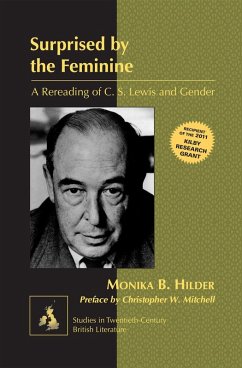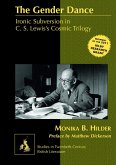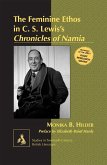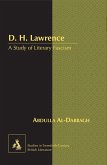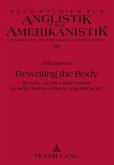C. S. Lewis, fantasy novelist, literary scholar, and Christian apologist, is one of the best-known and most original literary figures of the twentieth century. As one who stood at the crossroads of Edwardian and modern thinking, he is often read as a sexist or even misogynistic man of his time, but this fresh reading assesses Lewis as a prescient thinker who transformed typical Western gender paradigms. Surprised by the Feminine: A Rereading of C. S. Lewis and Gender proposes that Lewis's highly nuanced metaphorical view of gender relations has been misunderstood precisely because it challenges Western chauvinist assumptions of sex and gender. Instead of perpetuating sexism, Lewis subverts the culturally inherited chauvinism of «masculine» classical heroism with the biblically inspired vision of a surprisingly «feminine» spiritual heroism. His view that we are all «feminine» in relation to the «masculine» God - a theological feminism that crosses gender lines - means that qualities we tend to gender as feminine, such as humility, are the qualities essential to being fully human. This book's theoretical framework is Lewis's own, grounded in his view of biblical thinking and informed by the thinking of writers such as Milton, Wordsworth, and George MacDonald; thus it has uniquely progressive implications for twenty-first-century cultural studies. This highly insightful and entertaining study of theological feminism in Lewis's life's work, from Dymer and The Pilgrim's Regress, to The Screwtape Letters, The Great Divorce, and Till We Have Faces, will be compelling for anyone interested in fantasy literature, Inklings scholarship, gender discourse, ethical and spiritual discourse, the interplay of literature and theology, and cultural studies.
«Monika B. Hilder's carefully reasoned treatment of C. S. Lewis and women is the book for which the scholarly world has been waiting. It towers above other writing on the subject by virtue of the thoroughness of its scholarship, the breadth of context into which the question of Lewis and gender is placed, and the superior abundance of close reading of Lewis texts.» (Leland Ryken, Professor of English, Wheaton College)
«In Monika B. Hilder's 'Surprised by the Feminine: A Rereading of C. S. Lewis and Gender' we find a thoughtful, nuanced, scholarly, and penetrating exploration of the increasingly popular discussion of Lewis's understanding of gender. Hilder's exciting new contribution to the debate is her argument that Lewis consistently affirms values associated with the feminine. Lewis's 'theological feminism', according to Hilder, elevates spiritual heroism (characterized by imagination, passivity, care, submission, truthfulness, and humility) over the predominant Western notion of classical heroism (characterized by reason, autonomy, activity, aggression, conquest, deceit, and pride). In her study of Lewis's theological feminism Hilder primarily addresses his fiction, although she does not overlook his non-fiction and poetry. 'Surprised by the Feminine' is a major new contribution to Lewis studies.» (Don W. King, Professor of English, Montreat College; Editor, Christian Scholar's Review)
«In Monika B. Hilder's 'Surprised by the Feminine: A Rereading of C. S. Lewis and Gender' we find a thoughtful, nuanced, scholarly, and penetrating exploration of the increasingly popular discussion of Lewis's understanding of gender. Hilder's exciting new contribution to the debate is her argument that Lewis consistently affirms values associated with the feminine. Lewis's 'theological feminism', according to Hilder, elevates spiritual heroism (characterized by imagination, passivity, care, submission, truthfulness, and humility) over the predominant Western notion of classical heroism (characterized by reason, autonomy, activity, aggression, conquest, deceit, and pride). In her study of Lewis's theological feminism Hilder primarily addresses his fiction, although she does not overlook his non-fiction and poetry. 'Surprised by the Feminine' is a major new contribution to Lewis studies.» (Don W. King, Professor of English, Montreat College; Editor, Christian Scholar's Review)

